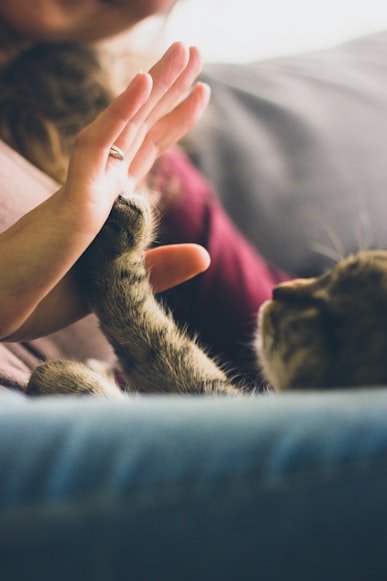Outline of Turkish Angora Cat

Introduction:
* Brief overview of the Turkish Angora cat, its origins, and its popularity.
Physical Characteristics:
* Body type: Slender and graceful with a muscular build.
* Coat: Long, silky, and flowing; available in a variety of colors.
* Head: Triangular shaped with large, expressive eyes.
* Ears: Large and erect with pointed tips.
* Tail: Long and plumed.
Temperament:
* Intelligent and curious.
* Affectionate and playful.
* Independent and strong-willed.
* Prone to vocalizing.
Care and Handling:
* Grooming: Regular brushing to maintain coat health.
* Bathing: Occasional baths as needed.
* Nutrition: Balanced diet consisting of high-quality cat food.
* Exercise: Requires regular activity and play.
Health and Lifespan:
* Average lifespan: 12-15 years.
* Common health concerns: Hypertrophic cardiomyopathy (HCM), dental disease.
Breeding:
* Mating behavior and breeding season.
* Litter size and kitten care.
* Registration and pedigree information.
Special Traits:
* Known for its luxurious coat and piercing blue eyes.
* Often referred to as the “national cat of Turkey.”
* Historical significance in art and literature.
Conclusion:
* Summary of the unique characteristics and qualities of the Turkish Angora cat.
* Reiterate its popularity as a beloved companion and admired breed.
* Encourage potential owners to research and consider the breed if it aligns with their lifestyle and personality.
Introduction
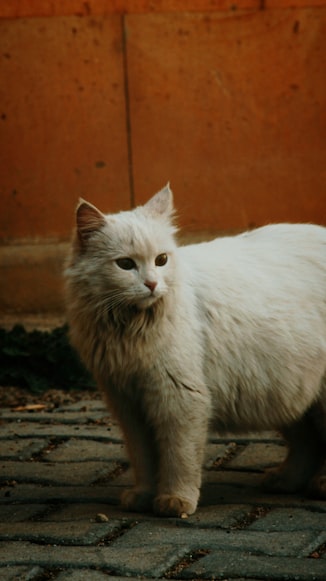
Introduction
The Turkish Angora, a feline masterpiece from the heart of Anatolia, is a captivating breed renowned for its ethereal beauty and regal lineage. With its flowing mane, piercing gaze, and a rich history dating back centuries, the Turkish Angora holds a special place among the feline aristocracy.
Historical Origins and Significance
The Turkish Angora is believed to have originated in the ancient city of Angora, present-day Ankara, Turkey. Genetic studies suggest that the breed’s roots may trace back to as early as the 16th century. During the Ottoman Empire, the Turkish Angora was revered as a symbol of elegance and nobility. It was often gifted to foreign dignitaries and European royalty, who marveled at its exquisite appearance and gentle nature.
In the 16th century, Turkish Angoras made their way to Europe, where they quickly gained adoration. French breeders played a significant role in developing the breed’s distinctive characteristics. In the 19th century, British cat enthusiasts imported Angoras from Turkey and established a dedicated breeding program. This led to the establishment of modern breed standards and the recognition of the Turkish Angora as a distinct feline breed.
Physical Characteristics
The Turkish Angora is a medium-sized cat with a graceful, slender body. Its most striking feature is its long, flowing coat, which can come in a variety of colors, including white, black, blue, and cream. The coat is silky to the touch and almost free of an undercoat, making it surprisingly low-maintenance.
Turkish Angoras have large, almond-shaped eyes that can be green, blue, or gold. Their ears are medium-sized and pointed, adding to their aristocratic expression. The tail is long and fluffy, often carried high like a banner.
Temperament
Despite its regal appearance, the Turkish Angora is known for its affectionate and playful nature. They are highly intelligent and eager to please, making them a joy to live with. Turkish Angoras are known for their strong bond with their owners and often seek out cuddles and attention.
They are also active and inquisitive cats who love to explore and play. They enjoy interactive toys and can be quite vocal when expressing their desires. Overall, the Turkish Angora is a delightful companion that brings beauty, grace, and endless amusement to its family.
Physical Characteristics
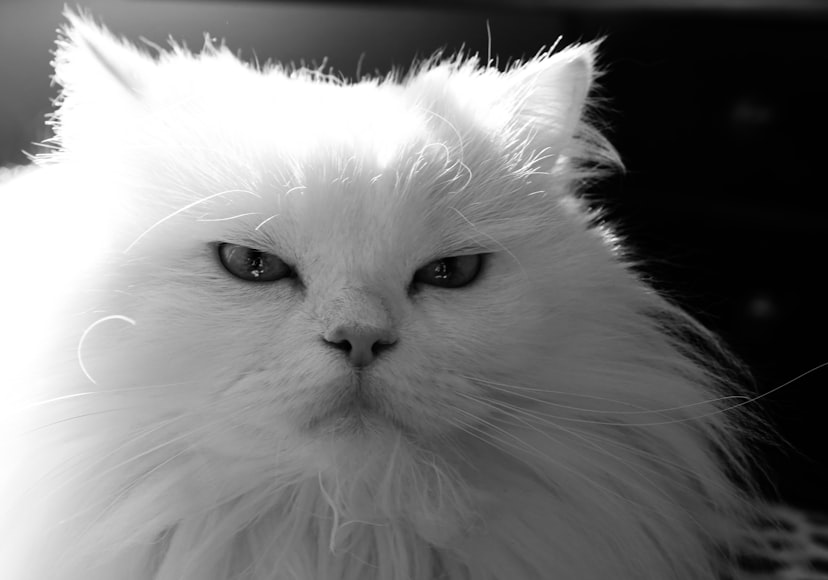
As a Turkish Angora Cat pet blogger, I’m often asked about the unique physical characteristics of this breed. Here’s a detailed breakdown of their striking features:
1. Slender and Graceful Body
Turkish Angora Cats are known for their slender and graceful bodies. They have a long, lean frame with delicate bones and a graceful gait. This physique allows them to move with incredible agility and poise.
2. Silky, Flowing Single Coat
The most distinctive feature of the Turkish Angora Cat is its silky, flowing single coat. It is composed of long, fine hairs with a soft, cashmere-like texture. The coat is typically white, but it can also be found in various shades of cream, blue, or black. The single coat makes the Turkish Angora Cat relatively low-maintenance, as it does not require frequent brushing or grooming.
3. Expressive Blue, Green, or Amber Eyes
The eyes of the Turkish Angora Cat are one of their most captivating features. They are large, almond-shaped, and come in a range of mesmerizing colors, including piercing blue, vibrant green, and warm amber. The expressive eyes of these cats convey a wide range of emotions, making them a joy to behold.
Additional Features:
- Long, bushy tail: The Turkish Angora Cat has a long, bushy tail that often reaches the ground.
- Large ears: Their ears are large and pointed, adding to their overall elegance.
- Feathering on legs: The feet of the Turkish Angora Cat are adorned with soft feathering.
The physical characteristics of the Turkish Angora Cat combine to create a stunning and graceful feline companion. Their slender bodies, silky coats, and expressive eyes make them a truly captivating breed.
Temperament and Personality
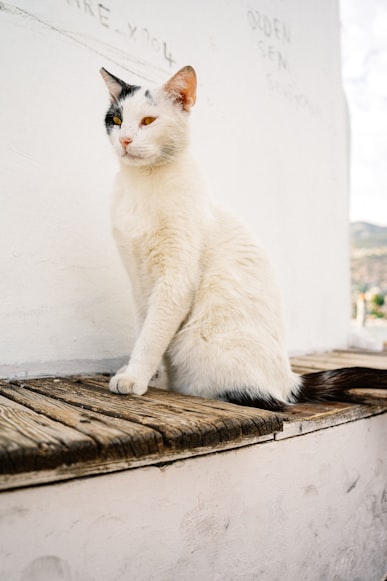
Renowned for their striking white coats and enchanting blue eyes, Turkish Angora cats are a captivating breed that has stolen the hearts of cat enthusiasts worldwide. Beyond their alluring appearance, these feline companions exhibit an endearing temperament that makes them a cherished addition to any household.
Affectionate and Loyal
Turkish Angora cats are deeply affectionate creatures who crave the love and companionship of their human guardians. They form strong bonds with their owners and will often seek out attention and cuddle time. Their loyalty is unwavering, as they tend to stick close to their loved ones and follow them around the house.
Playful and Active
Despite their sophisticated appearance, Turkish Angora cats are energetic and playful companions. They enjoy interactive games, such as chasing toys or climbing cat trees. Their agility and grace make them excellent climbers and jumpers, adding an element of excitement to their daily routine.
Highly Intelligent and Vocal
Turkish Angora cats possess a remarkable level of intelligence. They are quick learners and can be trained to perform various tricks. Their vocal nature is another charming trait, as they often communicate their needs and desires through soft chirps and meows.
Temperamental Nuances
While the general temperament described above is typical of Turkish Angora cats, there may be slight variations among individual cats. Some may be more independent or less vocal than others. It’s important to spend time with a potential pet before committing to ensure their temperament is a good match for your personality and lifestyle.
Conclusion
The Turkish Angora cat is a captivating breed that embodies affection, loyalty, playfulness, and intelligence. Their enchanting presence and endearing temperament make them a joy to have as companions. If you seek a feline friend who will fill your home with love, laughter, and endless cuddles, the Turkish Angora is undoubtedly a perfect choice.
Health and Care
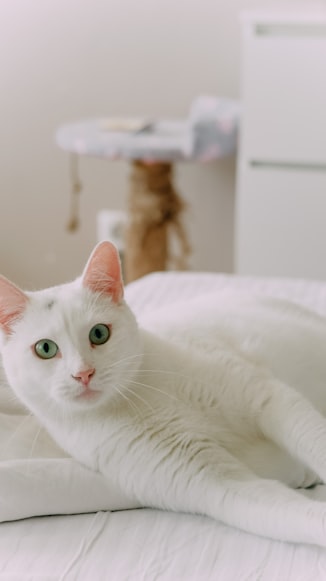
Turkish Angora cats are known for their distinctive long, flowing coats and affectionate personalities. While generally a healthy breed, they are prone to certain health concerns and require specific care to maintain their well-being.
Genetically Prone to Hypertrophic Cardiomyopathy:
Hypertrophic cardiomyopathy (HCM) is a condition in which the heart muscle thickens abnormally. It is the most common heart disease affecting cats, and Turkish Angoras are genetically predisposed to it. HCM can lead to heart failure, arrhythmias, and sudden death. Regular veterinary check-ups and screening for HCM are crucial for early detection and management.
Regular Grooming Essential for Coat Health:
The Turkish Angora’s long, silky coat requires regular grooming to prevent matting and maintain its beauty. Brushing the coat at least once a day helps distribute natural oils and remove loose fur. Bathing should be occasional, as excessive bathing can remove essential oils and damage the coat.
Additional Health Considerations:
-
Dental Health: Turkish Angoras are prone to dental disease, including periodontal disease and tooth decay. Regular dental check-ups and cleanings are important to maintain oral health.
-
Eye Health: Some Turkish Angoras can develop eye problems such as progressive retinal atrophy (PRA), which is a degenerative condition that leads to blindness. Routine eye exams are recommended to detect and monitor any eye issues.
-
Allergies: Turkish Angoras can be prone to allergies, which can manifest as skin irritation, itching, and respiratory problems. Identifying and managing allergens is essential for their comfort.
Care Tips:
-
Provide a high-quality diet: Feed your Turkish Angora a well-balanced diet that meets their nutritional needs.
-
Ensure adequate hydration: Provide your cat with plenty of fresh water throughout the day.
-
Maintain a healthy weight: Obesity can put strain on your cat’s heart and joints. Monitor your cat’s weight and make adjustments to their diet or exercise routine if necessary.
-
Provide mental stimulation: Turkish Angoras are intelligent cats that need mental stimulation to stay happy and healthy. Engage in interactive play and provide them with toys and puzzles to exercise their minds.
-
Seek regular veterinary care: Regular veterinary check-ups are essential for monitoring your cat’s health, detecting any potential issues early on, and providing preventive care.
By understanding the unique health and care requirements of the Turkish Angora cat, you can provide your furry companion with the best possible care and ensure a long and healthy life.
Lifespan and Longevity
The Turkish Angora cat, known for its elegant appearance and silky fur, is a beloved companion for many. Like all pets, understanding their expected lifespan is crucial for responsible ownership and care.
Average Lifespan
On average, Turkish Angora cats have a lifespan of 12-15 years. This range falls within the typical longevity of domestic cats, influenced by various factors such as genetics, health, and care.
Factors Affecting Lifespan
Several factors can impact the lifespan of Turkish Angoras:
- Genetics: Genetic predispositions can influence the likelihood of certain health conditions, which can affect lifespan.
- Health: Regular veterinary checkups, vaccinations, and parasite control can help prevent and manage health issues, extending the cat’s life.
- Diet: A nutritious diet tailored to their age and needs supports a healthy weight and reduces the risk of diet-related health problems.
- Exercise: Providing adequate physical and mental stimulation through play and interactive toys promotes well-being and longevity.
- Environment: A safe, stress-free environment with clean living spaces and access to veterinary care contributes to a long and healthy life.
Extending Lifespan
While genetics play a role, responsible care can significantly impact a Turkish Angora’s lifespan:
- Regular Checkups: Schedule routine veterinary appointments to detect and address any health issues early on.
- Nutrition: Provide a balanced diet that meets the cat’s energy needs and includes a variety of nutrient-rich foods.
- Exercise and Enrichment: Engage in regular play sessions and provide interactive toys to stimulate the cat’s mind and body.
- Environmental Care: Maintain a clean and comfortable home, free from hazards and potential stressors.
Conclusion
The Turkish Angora cat’s lifespan typically ranges from 12-15 years. By understanding the factors that influence longevity and providing responsible care, pet owners can help their beloved companions live long, healthy, and fulfilling lives. Regular veterinary checkups, a nutritious diet, adequate exercise, a supportive environment, and timely attention to health issues are all essential for extending the lifespan of these graceful and affectionate cats.
Allergies and Potential Health Issues
Turkish Angora cats, known for their distinctive silky coats, are generally hypoallergenic but may cause mild allergic reactions in some individuals. Like all cats, certain health issues can affect the breed.
Hypoallergenic to Mild Allergens
Turkish Angora cats are considered hypoallergenic, meaning they produce less of the protein Fel d 1, the primary allergen in cats that triggers allergic reactions. This makes them a suitable choice for people with mild cat allergies. However, it’s important to note that no cat breed is 100% hypoallergenic, and some individuals may still experience allergic reactions.
Prone to Dental Issues
Turkish Angora cats are prone to dental issues, particularly periodontal disease. Their narrow jaw structure and thin enamel can make them susceptible to plaque accumulation and gum inflammation. Regular dental checkups, brushing, and a dental diet are essential for maintaining good oral health.
Other Potential Health Issues
While dental issues are the most common health concern in Turkish Angora cats, they may also be affected by other conditions, such as:
- Hypertrophic cardiomyopathy (HCM): A genetic heart condition that can lead to heart failure.
- Polycystic kidney disease (PKD): A hereditary condition that affects the kidneys and can cause renal failure.
- Progressive retinal atrophy (PRA): A degenerative eye disease that can lead to blindness.
Conclusion
Turkish Angora cats are beautiful and affectionate companions with a hypoallergenic reputation. However, it’s crucial to be aware of their potential for mild allergies and susceptibility to dental issues. Regular veterinary care, including dental checkups, is essential for maintaining the health and well-being of these elegant felines. By understanding the potential health concerns associated with Turkish Angora cats, you can make informed decisions about pet ownership and provide your furry friend with the best possible care.
Training and Exercise
As a beloved owner of a Turkish Angora cat, you understand the importance of providing proper training and exercise to ensure their well-being and happiness. Here’s a comprehensive guide to help you navigate the essential aspects of training and exercising your furry companion:
Training
Turkish Angora cats are known for their intelligence and responsiveness to positive reinforcement. This makes them receptive to training, which is crucial for establishing healthy boundaries, teaching basic commands, and promoting bonding between you and your pet.
- Positive Reinforcement: Employ treats, praise, or gentle petting to reward desirable behaviors. This motivates cats to repeat actions that please you.
- Start Small: Begin with simple commands such as “sit” or “stay” and gradually increase complexity as your cat progresses.
- Consistency is Key: Train your cat in short, regular sessions to avoid overwhelming them. Be consistent with your commands and rewards to ensure effective learning.
Exercise
Turkish Angora cats require daily exercise to maintain their physical and mental well-being. Providing interactive play and opportunities for exploration is essential for their happiness and contentment.
- Interactive Play: Engage your cat in interactive play sessions using toys such as feather wands, laser pointers, or puzzle feeders. This stimulates their hunting instincts and provides mental enrichment.
- Vertical Spaces: Provide your cat with access to vertical spaces, such as cat trees or climbing shelves. This allows them to climb, jump, and exercise their muscles.
- Outdoor Adventures: If possible, consider providing your cat with access to a safely enclosed outdoor space under supervision. Exploring the natural environment provides excellent exercise and stimulation.
Additional Tips
- Establish Boundaries: Train your cat to respect boundaries and avoid unwanted behaviors, such as scratching furniture or biting.
- Socialization: Expose your cat to new people and situations to promote socialization and prevent fear or aggression.
- Mental Stimulation: Provide your cat with plenty of mental stimulation through interactive toys, puzzle feeders, and enrichment activities.
By adhering to these training and exercise guidelines, you can foster a strong bond with your Turkish Angora cat while ensuring their physical, mental, and emotional well-being. Remember, training and exercise are an ongoing process that requires patience, consistency, and a deep understanding of your cat’s unique needs.
Choosing and Acquiring a Turkish Angora
As a Turkish Angora enthusiast, I’m delighted to guide you through the process of choosing and acquiring this enigmatic feline companion. Whether you’re looking for a pedigreed show cat or a loving pet, it’s crucial to make an informed decision for a harmonious and fulfilling relationship.
Consider Reputable Catteries or Adoption Organizations
Acquiring a Turkish Angora is best achieved through reputable catteries or adoption organizations. These establishments prioritize the health and well-being of their cats, ensuring they receive proper care, vaccinations, and socialization.
- Catteries: Look for catteries that specialize in breeding Turkish Angoras and have a proven track record of producing healthy and well-bred cats. Visit the cattery to observe the environment, interact with the kittens, and inquire about their health and lineage.
- Adoption Organizations: While less common, adoption organizations may have Turkish Angoras available for adoption. These cats may have come from various backgrounds, but responsible organizations will screen their health and ensure they’re ready for a new home.
Look for Well-Socialized and Healthy Individuals
When selecting an individual Turkish Angora, pay attention to their socialization and health.
- Socialization: Turkish Angoras are typically friendly and playful cats. Observe kitten interactions and ensure they’re comfortable being handled and interacting with people and other animals.
- Health: Ensure the cat you choose is healthy by requesting a veterinary examination and asking for documentation of vaccinations and deworming. Healthy kittens will have clear eyes, a shiny coat, and no signs of illness.
Additional Considerations:
- Cost: Turkish Angora kittens from reputable catteries can range in price from $800 to $2,500 or more. Adoption fees typically range from $100 to $300.
- Grooming: Turkish Angoras have a long, flowing coat that requires regular brushing to prevent matting. Be prepared for a moderate amount of shedding.
- Exercise and Play: Turkish Angoras are active cats that enjoy climbing, chasing, and playing. Provide them with plenty of opportunities for physical and mental stimulation.
By following these guidelines, you’ll increase the chances of finding a loving and healthy Turkish Angora companion that will bring years of joy and companionship into your life. Remember to do your research, ask questions, and approach the acquisition process with care and enthusiasm.
Cost and Ownership
As a Turkish Angora Cat pet blogger, I’m going through the financial considerations associated with owning one of these graceful and affectionate felines. Understanding these costs will help you make an informed decision about whether this breed is suitable for your lifestyle and budget.
Purchasing Costs:
- Breeder: Reputable breeders typically charge between $500 and $1,500 for a Turkish Angora kitten.
- Adoption: If you’re considering adoption, fees can range from $50 to $200.
Care Costs:
- Food: High-quality cat food costs approximately $30-$60 per month.
- Litter: Standard cat litter costs around $10-$20 per month.
- Toys: Interactive toys and scratching posts can cost around $5-$20 each.
- Grooming: Regular brushing and occasional baths can cost $40-$80 per session.
Health Maintenance Costs:
- Vaccinations: Routine vaccinations start at around $50 per year.
- Health checkups: Annual checkups typically cost between $100 and $200.
- Dental care: Professional dental cleanings can range from $150 to $300.
- Pet insurance: Consider pet insurance to cover unexpected medical expenses. Monthly premiums can vary depending on the plan chosen.
Other Considerations:
- Spay/neuter: This procedure can cost around $200-$500.
- Microchipping: Implanting a microchip for identification costs approximately $50-$100.
- Travel expenses: If you plan to travel with your cat, factor in costs for pet-friendly accommodation, transportation, and veterinary care.
Total Estimated Annual Costs:
Based on the above estimates, the average annual cost of owning a Turkish Angora Cat can range from $1,200 to $2,000, depending on factors such as lifestyle, health, and location.
Conclusion:
Owning a Turkish Angora Cat is a rewarding experience, but it’s important to be aware of the financial responsibilities involved. Before making a commitment, carefully consider the ongoing costs of care, health maintenance, and other expenses. By budgeting appropriately, you can provide your feline friend with a happy and healthy life while ensuring that it’s a financially sustainable choice for you.
Additional Facts and Trivia
National Pride:
- The Turkish Angora is the national cat of Turkey, where it is highly revered and considered a symbol of elegance and refinement.
Purity and Cleanliness:
- In Turkish culture, the Angora cat has long been associated with purity and cleanliness. It is believed that the Prophet Muhammad favored white cats, which contributed to the breed’s reputation for holiness.
Other Interesting Facts:
- Silk-like Coat: The Angora cat is known for its long, flowing coat that has a silky texture, similar to cashmere.
- Origin: The breed originated in Ankara, Turkey, in the 15th century.
- Natural Born Athletes: Angoras are energetic and athletic cats with a playful and curious nature.
- Distinct Chin: The Angora has a prominent chin that gives its face a uniquely refined appearance.
- Highly Intelligent: Angoras are known for their intelligence and quick wit. They are eager to learn and bond closely with their humans.
- Vocal Cats: Turkish Angoras are prone to being vocal and enjoy communicating with their owners through meows and chirps.
- Love of Water: Unlike most cats, Angoras enjoy playing with water and may even swim on occasion.
- Rare Eye Color: Turkish Angoras often have striking blue or green eyes, a characteristic that is highly prized in the breed.
- Health: Angoras are generally healthy and long-lived cats, with an average lifespan of 12-15 years. However, they are prone to dental disease and hypertrophic cardiomyopathy (HCM) in old age.













